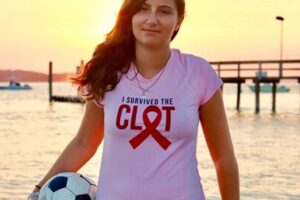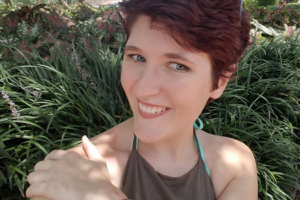In 2005, I had severe uterine bleeding which lasted for 10 months. As a result, I was forced to have an emergency hysterectomy. In an effort to try to stop the bleeding, I was encouraged to take high doses of estrogen-based birth control pills. Two days before my surgery, I was also given two shots of estrogen-based medication to try and stop the bleeding, which didn’t work. I had to have five blood transfusions before doctors could safely perform the hysterectomy.
The next morning after my surgery, I began having a pain in my lower left calf. It felt like a charley horse. I complained about it, but the nursing staff just said to get up and walk around. I requested an ultrasound, but the doctor did not order one. I wore compression socks after my surgery, walked around, and did everything I was told to do to help prevent blood clots. I was sent home after two days, with the pain still in my calf.
Throughout the next week, I had worsening symptoms of not being able to breathe, and I couldn’t catch my breath. It got so bad I was sleeping in my recliner chair in the living room. I finally decided to go to the emergency room, where I found out I had two pulmonary embolisms, or blood clots in my lungs. I was put on blood thinners for about eight months. It was extremely painful, and there was not much I could do, but wait for my body to hopefully absorb the fluid in my lungs and dissolve the clots.
All of this happened when I was 36 years old, and I am very lucky to be alive. Every single time I read about someone who has died from a blood clot in the lung, I still get chills. I worry every time I get a pain in my leg, or when I have to fly.
I’ve learned I can exercise my lungs and work on my breathing, but I’ve also learned I may have lasting scar tissue in my lungs and in my heart. I had a scare with irregular heartbeats in 2016, although my cardiologist seems to think everything is okay now. In December 2017, I had to have surgery, and was scared I might have blood clots again, but thankfully, I did not.
The best advice I can share is to listen to your body. If something doesn’t feel normal, then it probably isn’t. Be an advocate for yourself and demand good healthcare. Live your best life!
More Information and Resources:
- Join our online peer support community to connect with other people who have experienced a blood clot.
- Learn more about estrogen-based birth control and blood clot risks.
- Learn more about surgery and hospitalization as risk factors for blood clots.
- Read more stories, or share your story with NBCA.




